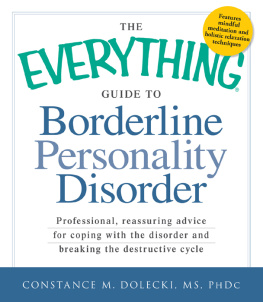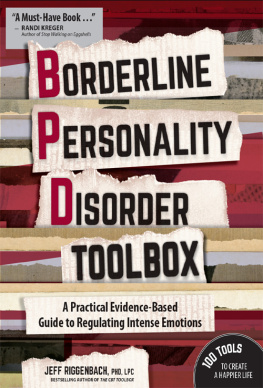Lost in the Mirror
Lost in the
Mirror
An Inside Look at
Borderline Personality Disorder
SECOND EDITION
Richard A. Moskovitz, M.D.

The author gratefully thanks the following for permission to reprint previously published material:
Peter Alsop for lyrics from Look at the Ceiling by Peter Alsop, taken from the recording Uniforms. Copyright 1981 by Moose School Music.
American Psychiatric Association for an excerpt from Diagnostic and Statistical Manual of Mental Disorders, Fourth Edition. Copyright 1994 by the American Psychiatric Association.
Bantam Doubleday Dell for permission to reprint lines from The Velveteen Rabbit by Margery Williams.
Chrysalis Music Group for lyrics from Hell is for Children by Pat Benatar, Neil Geraldo, and Roger Capps. Copyright 1980 by Chrysalis Music/Big Tooth Music/Neil Geraldo/Muscletone Music (Ascap). International copyright secured. All rights reserved.
Houghton Mifflin Company for permission to reprint material from Words for Dr. Y by Anne Sexton, edited by Linda Gray Sexton. Copyright 1978 by Linda Gray Sexton and Loring Conant, executors of the will of Anne Sexton. All rights reserved.
PolyGram Music Publishing for permission to reprint lyrics from Candle in the Wind by Elton John and Bernie Taupin. Copyright 1973 Dick James Music, Ltd. All rights reserved.
William Morris Agency, Inc. for permission to reprint a line from Gone with the Wind by Margaret Mitchell. Copyright 1936 by Margaret Mitchell.
Copyright 1996, 2001 by Richard A. Moskovitz, M.D.
All rights reserved.
First edition 1996
No part of this book may be reproduced in any form or by any meansincluding photocopying and electronic reproductionwithout written permission from the publisher.
Published by Taylor Trade Publishing
An Imprint of the Rowman & Littlefield Publishing Group
4501 Forbes Blvd., Suite 200
Lanham, Maryland 20706
Distributed by National Book Network
Library of Congress Cataloging-in-Publication Data
Moskovitz, Richard A.
Lost in the mirror : an inside look at borderline personality disorder / Richard A.
Moskovitz.2nd ed.
p. cm.
Includes bibliographical references and index.
ISBN: 978-0-87833-266-3
1. Borderline personality disorderPopular works. I. Title.
RC569.5.B67 M67 2001
616.85'85dc21
00-053619
Printed in the United States of America
To Betty
A gifted nurse whose compassion and serenity
soothed many troubled lives.
Your friends never knew the pain held deep within
your own heart.
We will miss you.
Contents
Foreword
It is a great pleasure and honor to write the foreword for this impressive work, Lost in the Mirror. Dr. Moskovitz is to be commended for producing this very readable book on such an intense psychiatric problem.
Through his many years practice of psychiatry, he writes with understanding and sympathy for the thought-provoking problems of the patient. He approaches the subject with knowledge and sensitivity and leads his reader, professional and layman alike, to another level of discovery. This writing brings new insight and comprehension to concepts introduced in previous studies by other physicians and researchers. It helps one to rediscover the human significance of mental illness, conveying the desperate emptiness felt by the borderline patient while at the same time illuminating and broadening our understanding of a disorder that has already undergone intense scrutiny. Dr. Moskovitz offers both an educational source of information as well as a moving walk in anothers shoes.
I have great respect for the pride and responsibility Dr. Moskovitz has invested in this work. Over the years I have discovered that people need emotional freedom for their lifes journey. A personality disorder can interfere with ones ability to enjoy the true gift of living, often resulting in a nightmare of false beliefs and painful concentration on weaknesses without recognition of strengths. Through the professional attitudes and capable therapy of physicians like Dr. Moskovitz, these rigid patterns are diminished, allowing the emergence of a whole person with renewed human spirit and purpose.
This book is a valuable resource for all who seek to recognize the pain of mental illness. I believe that reviewers and readers alike will embrace this new energy and will praise this scholarly contribution.
CHRIS COSTNER SIZEMORE
Ocala, Florida, 1996
author of The Final Face of Eve,
Im Eve, and A Mind of My Own
Preface to the
First Edition
This book is written in response to years of grappling with the treatment of patients with Borderline Personality Disorder (BPD). BPD describes a complex of symptoms and behaviors that share characteristics with, or border upon, other well-defined psychiatric problems such as schizophrenia and depression. Since the term was originally coined, its own characteristics have been better defined and its distinction from other disorders better appreciated. The term borderline therefore refers to the derivation of the diagnosis, not to a quality of an individual.
People with BPD have been among the most engaging as well as the most provocative of my patients. They have also been among my riskiest patients because in their struggle to be alive they often tempt death. Their treatment has been ridden with crises, challenges, and opportunities for both patient and therapist to learn. My patients have taught me much about what it feels like to be them.
Despite the fact that an estimated one in ten adult women and a smaller number of men suffer from BPD, the disorder is still little known to the general public and poorly understood even by many of the professionals who treat it. As many as one in four patients in psychiatric treatment may have BPD. This still accounts for only a small fraction of people with the disorder. Even those who do find their way into treatment are often inadequately diagnosed. Their symptoms then fail to respond to treatments for anxiety, depression, bulimia, or whatever else has been identified as the problem. They may, at that point, leave treatment.
Failure to recognize BPD often results from limited information about the patient. Key symptoms, such as self-mutilation, may be withheld from the therapist out of embarrassment. The current emphasis on cost-efficient, short-term treatments also creates a tendency for some therapists to look for simple problems that can be solved quickly, perhaps with medication.
Until recently, BPD was a diagnosis that hospital staff and mental health professionals whispered behind closed doors. The diagnosis has been tainted with negativity because of the turmoil these patients bring to the treatment setting. They test our limits and probe deeply at our inadequacies.
During my years of teaching medical and psychiatry students, I have seen powerful emotional reactions to people with BPD. Some trainees become deeply entangled with such patients and develop fantasies of rescuing them from their suffering. Others find themselves suddenly involved with their patients in intense, often hostile power struggles.
The incomplete understanding of BPD shared by many providers of treatment, particularly in inpatient settings, often undermines the alliance that should develop between patient and provider to solve problems together. Any secrecy about diagnosis further undermines treatment.
For years I participated in keeping the secret. BPD was a complex concept that seemed too difficult for patients to understand. As my own understanding of the disorder grew, primarily through experiences with patients, I began to talk more openly with my borderline patients about their diagnosis. I was surprised by their reactions.
Next page










